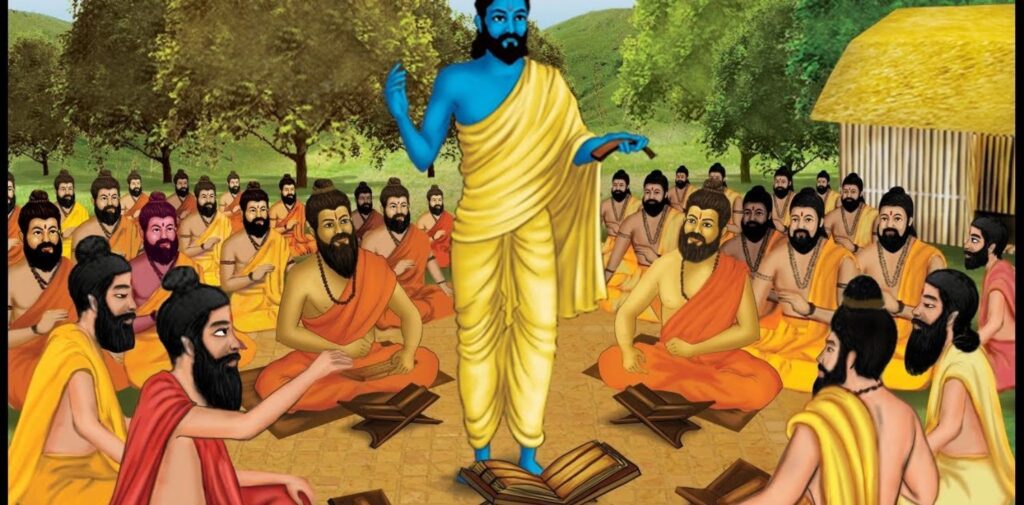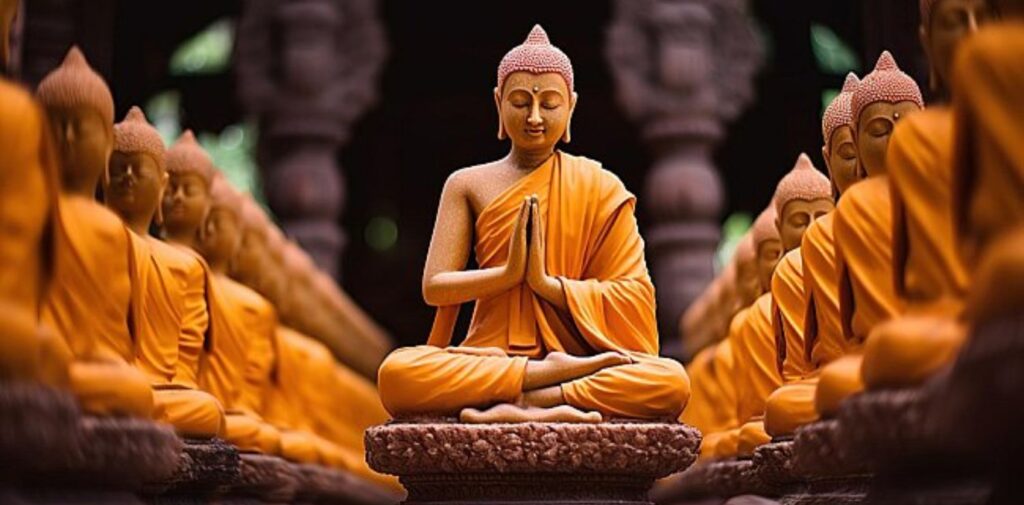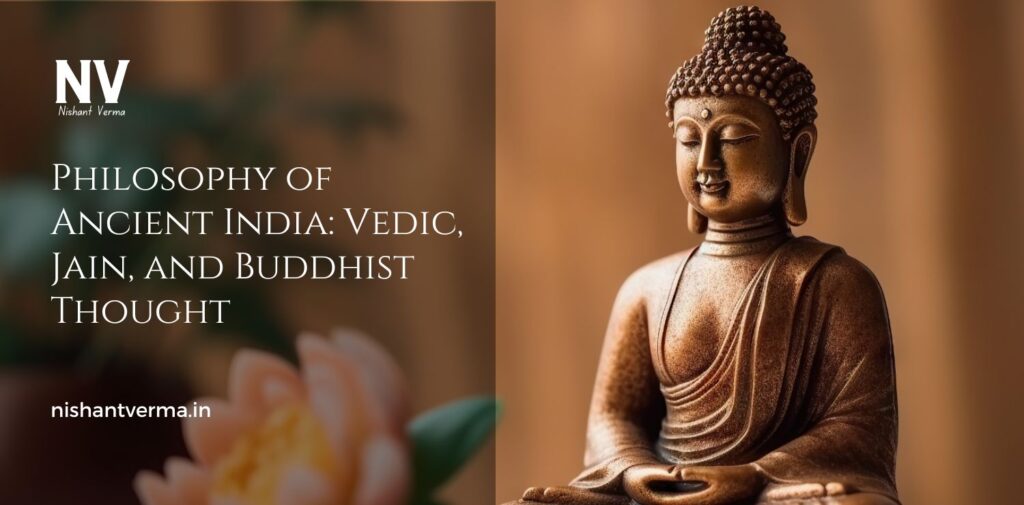India has a rich and ancient history of philosophy that dates back thousands of years. The people of Philosophy of Ancient India thought deeply about life, nature, the universe, and the self. Their ideas were not only about how to live a good life but also about how to understand the world around them. The three most important schools of thought Philosophy of Ancient India are Vedic, Jain, and Buddhist philosophy. These philosophies shaped much of India’s culture, religion, and way of thinking even today. Let’s dive into these ideas in simple terms to understand how they influenced Indian history and independence.
Vedic Philosophy: The Foundation of Thought
The Vedic Philosophy of Ancient India is the oldest and most important in the history of India. It comes from the sacred texts known as the Vedas, which were written thousands of years ago. The Vedas are a collection of prayers, hymns, and rituals. These texts were written in Sanskrit and were passed down orally from generation to generation.
The main idea in Vedic philosophy is that the universe is governed by a higher power called Brahman. Brahman is believed to be the source of everything in the world — the earth, the sky, the stars, and even human beings. The Vedic people believed that everything in nature is connected, and they worshipped different gods and goddesses who represented various aspects of Brahman.
The Vedic people also believed in dharma, which means the right way to live. Following dharma was very important in their daily life. They also practised karma, the idea that every action, whether good or bad, has consequences. Good actions lead to positive results, while bad actions lead to negative ones.

Jain Philosophy: Ahimsa and Non-Violence
Jainism is another ancient philosophy from India that started around the same time as Buddhism. It was founded by Lord Mahavira, who was born in the 6th century BCE. Jainism teaches that the universe is eternal, without a beginning or an end, and that it operates based on its laws.
The key idea in Jain philosophy is ahimsa, which means non-violence. Jainism teaches that all living beings — humans, animals, and even plants — have a soul. So, causing harm to any living creature is considered wrong. Jains believe that by living a life of non-violence, people can purify their souls and achieve freedom from the cycle of birth and death.
Jain philosophy also emphasizes the importance of truth, non-stealing, and self-control. Jain monks and nuns follow very strict rules of non-violence and simplicity. They even go to great lengths to avoid harming tiny insects. For example, many Jains carry a small broom to sweep the ground in front of them to avoid stepping on any insects.
Buddhist Philosophy: The Path to Enlightenment
Buddhism was founded by Siddhartha Gautama, who later became known as the Buddha, around the 5th century BCE. Like Jainism, Buddhism also teaches that suffering is a part of life, but it offers a way to end that suffering. The main goal of Buddhist philosophy is to reach a state of enlightenment, or nirvana, which is freedom from suffering and the cycle of rebirth.
The Buddha taught that life is full of dukkha, which means suffering or dissatisfaction. He explained that this suffering is caused by our desires and attachments to things that are temporary. The key to ending suffering is to let go of these desires and attachments.

Buddha gave what is known as the Four Noble Truths. These truths explain the nature of suffering and how to overcome it. The first truth is that suffering exists. The second is that suffering is caused by desire. The third is that it is possible to end suffering by letting go of desires. The fourth is the Eightfold Path, a set of guidelines for living a good and peaceful life.
The Eightfold Path includes things like right speech, right action, right mindfulness, and right concentration. By following these guidelines, a person can lead a life that helps them achieve peace and happiness. The ultimate goal is to attain nirvana, a state of perfect peace and freedom from all suffering.
Key Differences Between Vedic, Jain, and Buddhist Thought
While the Vedic, Jain, and Buddhist philosophies share some ideas, they also have important differences.
- Vedic philosophy focuses on the worship of many gods and the belief in Brahman as the ultimate reality. It is closely tied to rituals and sacrifices. The Vedic people believed that following the right rituals and performing sacrifices could bring them blessings and good fortune.
- Jain philosophy, on the other hand, emphasizes non-violence and the idea that every living being has a soul. Jainism does not believe in a creator god but instead teaches that the universe operates on its laws. Jains believe in strict self-discipline and renouncing material things to achieve spiritual freedom.
- Buddhist philosophy is different because it teaches that suffering is caused by desire and that the path to peace is through understanding and letting go of desires. Unlike Jainism and Vedic philosophy, Buddhism does not believe in a permanent soul or a creator god. Instead, it focuses on personal enlightenment through meditation and moral living.

Impact on Indian Independence and Culture
The ideas from Vedic, Jain, and Buddhist Philosophy of Ancient India had a huge impact on India’s culture and history, including the struggle for independence. These teachings influenced the way people thought about life, morality, and society.
During the Indian independence movement in the 20th century, leaders like Mahatma Gandhi were deeply inspired by Jain teachings, especially the idea of ahimsa or non-violence. Gandhi believed in peaceful resistance and used the principles of non-violence to lead the country toward independence from British rule.
The Buddhist emphasis on meditation and the search for inner peace also influenced many leaders. Even though Buddhism itself had faded in India over the centuries, its teachings lived on in the hearts of many Indians, especially in their desire for justice and freedom.
The Vedic traditions also played a role in shaping the cultural identity of India. Many of India’s ancient texts, festivals, and practices come from the Vedic traditions. These practices have continued to influence the country’s spiritual and philosophical life.
Conclusion: The Eternal Wisdom of Philosophy of Ancient India
Philosophy of Ancient India , whether from the Vedas, Jainism, or Buddhism, continue to guide the lives of millions of people today. They offer timeless wisdom on how to live peacefully, how to understand the world, and how to find true happiness. These philosophies teach us the importance of kindness, non-violence, self-discipline, and understanding our inner selves.
As we look back at the rich history of India’s philosophy, we see that these teachings have not only shaped the spiritual and moral framework of Indian society but also played a vital role in the country’s journey to independence. The principles of non-violence, truth, and self-realization still resonate in the modern world, showing that the wisdom of ancient India is not just relevant for the past but for the future as well.




